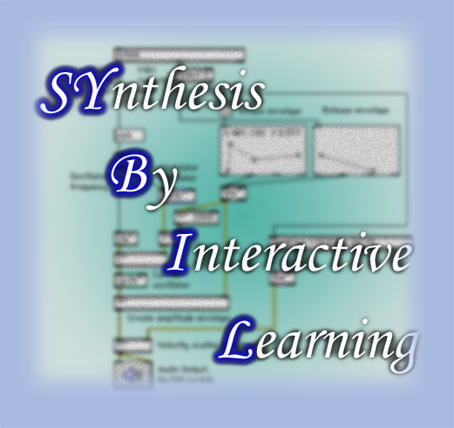
Summary
Modules
Build Your Own
Documentation
Contact

Sybil (Synthesis by Interactive Learning) is a flexible, extensible software package for the teaching of Music Technology. In fact its flexibility means that it can in principle be adapted to any situation where interactive experimentation with sounds is important. Sybil is written in Max/MSP but the completed modules are compiled as collectives or standalones and so can be used without purchasing Max/MSP itself. Those who own Max/MSP can build their own Sybil modules. The section 'Build your own' gives information on this.
Under ‘Documentation’ you can find a tour of Sybil with screen shots and a paper on Sybil presented at the 2004 International Computer Music Conference.
The version currently presented here is for Mac OSX only. An earlier OS9 version is no longer supported. A Windows version is currently in preparation.
The original Sybil modules (available for download on this site) are: Introduction to sound synthesis and processing and FOF synthesis: an introduction. Sybil has also been used to create an interactive aural analysis (by Michael Clarke) of Jonathan Harvey's Mortuos Plango, Vivos Voco. This accompanies the analysis published in Analytical Methods of Electroacoustic Music (ed. Mary Simoni, Routledge). The latest version of the analysis software can be downloaded from the modules page.
It is hoped that others will contribute modules to Sybil and will share them. If you intend to create new modules, or have modules to share please contact Michael Clarke j.m.clarke@hud.ac.uk
Sybil was created by Michael Clarke, Ashley Watkins, Mathew Adkins and Mark Bokowiec. It was awarded a 2004 European Academic Software Award at the competition in Le Locle/Neuchätel, Switzerland. Sybil continues a long tradition of interactive software development in Music at Huddersfield. Our earlier Huddersfield EASA award-winning packages are SYnthia (Synthesis Instruction Aid, 1994, - now superceded by SybiI) and Calma (Computer Assisted Learning for Musical Awareness, 2000).
LINK TO OUR CALMA PAGE